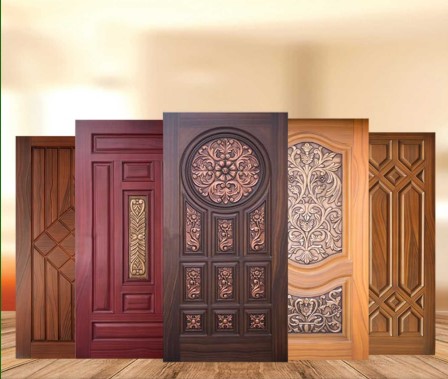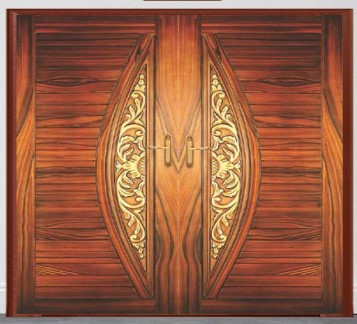Benefits of Fiber Doors
Fiber doors, also known as fiberglass doors, have gained significant popularity in recent years due to their numerous advantages over traditional wooden and metal doors. These doors are made from a combination of fiberglass, resin, and other materials, creating a strong, durable, and versatile product. In this essay, we will explore the advantages of fiber doors in detail, covering various aspects such as durability, energy efficiency, aesthetics, security, and environmental impact.

Durability and Strength:
One of the primary advantages of fiber doors is their exceptional durability and strength. Unlike wooden doors, which are susceptible to rot, warp, and insect damage, and metal doors, which can rust and corrode, fiber doors are highly resistant to these issues. They do not warp, crack, or rot, even in extreme weather conditions, making them ideal for both interior and exterior applications. This durability ensures a longer lifespan, reducing the need for frequent replacements and repairs.
Energy Efficiency of Fiber Doors:
Fiber doors offer excellent thermal insulation properties, making them highly energy-efficient. Properly insulated doors help in maintaining consistent indoor temperatures by preventing heat exchange between the interior and exterior environments. This insulation capability can contribute to significant energy savings by reducing the need for heating or cooling, especially in regions with extreme weather conditions. Homeowners can experience lower utility bills and a more comfortable living environment due to the energy efficiency of fiber doors.
Aesthetics and Customization:
Fiber doors are available in a wide range of designs, styles, and finishes, allowing homeowners to choose doors that complement their architectural preferences and interior decor. Advanced manufacturing techniques enable the replication of natural wood textures and intricate designs, providing the aesthetic appeal of wooden doors without the associated maintenance challenges. Additionally, fiber doors can be easily customized to fit specific size requirements, making them suitable for various door openings in homes, offices, and commercial spaces.
Security:
Security is a paramount concern for homeowners, and fiber doors offer enhanced security features. These doors are inherently strong, making them difficult to break through or force open. They can be reinforced with additional security features such as multi-point locking systems, impact-resistant glass, and advanced electronic access control systems, further enhancing the security of properties. The robust construction of fiber doors acts as a deterrent against burglars and intruders, providing peace of mind to homeowners.
Low Maintenance in Fiber Doors:
Fiber doors require minimal maintenance compared to wooden doors. Unlike wood, they do not need regular painting or staining to protect them from the elements. Fiber doors are resistant to moisture, insects, and UV rays, ensuring their appearance remains intact over time. Occasional cleaning with mild soap and water is usually sufficient to maintain their aesthetics. This low maintenance requirement saves homeowners time, effort, and money in the long run.
Environmental Impact:
Fiber doors are an eco-friendly choice for environmentally conscious consumers. The production of fiberglass doors consumes fewer natural resources compared to wooden doors, which require cutting down trees. Additionally, fiberglass doors are recyclable, reducing the environmental impact when they reach the end of their lifespan. By choosing fiber doors, individuals contribute to the conservation of forests and reduce the carbon footprint associated with traditional door materials.
Resistance to Environmental Factors:
Fiber doors exhibit excellent resistance to various environmental factors such as moisture, extreme temperatures, and sunlight. Unlike wooden doors that can swell or warp when exposed to moisture, fiber doors remain unaffected, maintaining their shape and functionality. They do not deteriorate when subjected to prolonged sunlight exposure, making them suitable for doors that receive direct sunlight. These qualities make fiber doors ideal for both interior and exterior use, ensuring their longevity regardless of the environmental conditions.
Sound Insulation of Fiber Doors:
Fiber doors provide effective sound insulation, creating a quieter and more peaceful indoor environment. They reduce the transmission of external noises, such as traffic sounds, barking dogs, or loud neighbors, improving the overall comfort of living spaces. Enhanced sound insulation is particularly beneficial for homes located in noisy urban areas, close to highways, or in proximity to commercial establishments.
Fire Resistance:
Fiber doors offer a higher level of fire resistance compared to wooden doors. In the event of a fire, fiberglass does not contribute to the flames and can help contain the fire to a certain extent. This fire-resistant property provides additional safety to occupants and valuable time for evacuation in case of emergencies.
Final Words
In conclusion, fiber doors stand out as a superior choice for modern constructions and renovations due to their durability, energy efficiency, aesthetics, security features, low maintenance requirements, environmental benefits, resistance to environmental factors, sound insulation, and fire resistance. Homeowners, architects, and builders are increasingly recognizing the advantages of fiber doors, leading to their widespread adoption in residential, commercial, and industrial applications. As technology continues to advance, fiber doors are likely to become even more innovative, further enhancing their properties and solidifying their position as the door material of choice for the future.
Read more on Jamztang







